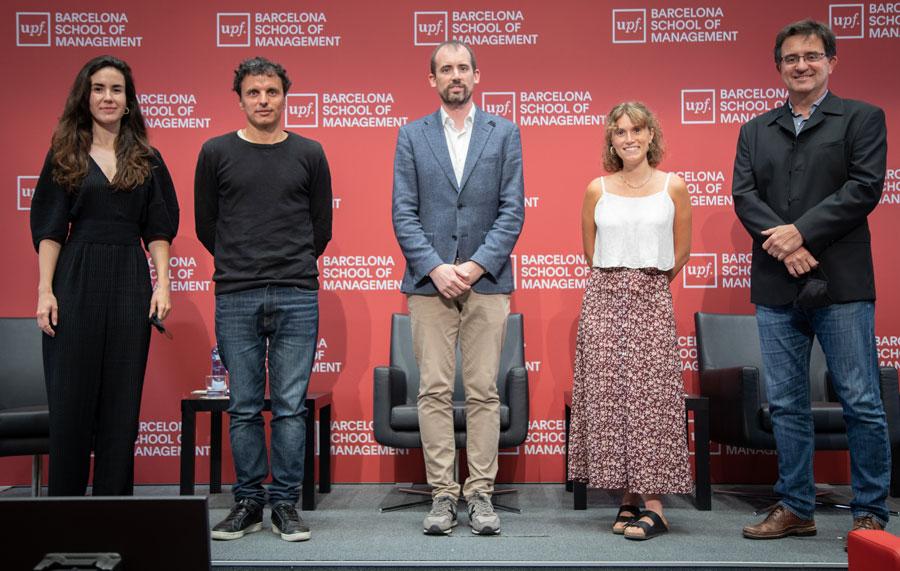"You can only take care of the things you know, and the sea is a great unknown"
2 Junio - 2021"The oceans endure, but the course we humans have taken is leading them to failure." This is one of the conclusions reached by the panelists at the session "OceanLab: the adventure in the seas to save the planet", organized at UPF Barcelona Schoof Management for the Environment Week. For 90 minutes, the director of the Sustainability Observatory, Oriol Montanyà, guided the conversation towards the sea and its protection from perspectives as different as communication, science, cinema, economics and technology.
"We can only take care of things if we know them, and the sea is a great unknown," said Laura Secorun, Project Manager of OceanLab, a venture that aims to put the media revenue from the Vendée Globe - the most popular solo round-the-world race - at the service of the planet and open the initiative to people who want to do research on board."The task of dissemination is key," said Secorun, who admitted that although sailing is a "very visual" sport, it is still "little known".
In the sea, you can see very clearly when human action is close by
One of the most important points at OceanLab's disposal is the figure of Dídac Costa, firefighter, sailor and the first Spanish sailor to complete the Vendée Globe twice."I have experienced the sea very closely since I was a child and I have been able to enjoy the sensations that sailing gives you," Costa explained.
However, both speakers acknowledged that OceanLab is a "very complex project". "There are external elements that can make you leave the race, not everything depends on you," said Costa, who defended the importance of "having a team behind you". "There are many days alone and fatigue accumulates. You can't delegate tasks to anyone and it shows," he added.
An extraordinary project is made day by day
"This man is going far away and in the Pacific the coverage is not extraordinary", said the Project Manager referring to Costa, highlighting the need to be "very prepared" based on three key concepts:
- Prioritize: there are many things to do and they must all be done at the same time. We must have a vision of the whole, but go step by step.
- Coordinate expectations: it is important to find synergies with partners so as not to pull in opposite directions.
- Teamwork: the key to success is the human quality and the enthusiasm of the group members.
Still on management, Secorun has claimed the fluid relationship with sponsors, since "each company has different needs: from branding and pure marketing or communication and content in networks to involvement in projects that are beneficial to the environment in terms of CSR".
"One of the most satisfying things has been to open a window in such a wild and inhospitable place," agreed the two OceanLab representatives. However, they also pointed out that even in the farthest corners of the world, pollution reaches the seas.

Awareness, a key aspect
"In the sea you can perceive very clearly when there is human action nearby," Costa lamented. "Although it is true that the farther away you go, the less you can see, we cannot say that the oceans are clean, since they suffer from the presence of microplastics," the captain denounced.
According to this explanation, at a visual level the "traffic light of the oceans is red". However, the marine ecologist of the Consejo Superior de Investigaciones Científicas (CSIC), Miguel Ángel Mateo, has launched a message of optimism: "The oceans, as a whole, are not in a critical situation", but he has warned that there are "areas that are totally destroyed".
The oceans are the pantry of humanity, we must learn to exploit them without bringing their ecosystems to collapse
"The oceans are the pantry of humanity, since there are very abundant resources in them that are found in a way that humans have not learned to manage," analyzed Mateo, who urged us to "learn to exploit them without bringing their ecosystems to collapse." How can this be done? By raising awareness.
"Art and sport are the two most powerful engines to raise awareness among the population," insisted the scientist, an idea supported by the filmmaker, UPF alumni and student of the Postgraduate in Audiovisual Editing at UPF-BSM, Mònica Cambra. "Our aim is not to inform, but to excite, because we speak from the truth," concluded the filmmaker, whose short film Mareas Ocultas (Hiden Tides), winner of DOCS Barcelona 2020, was screened. 2020.
